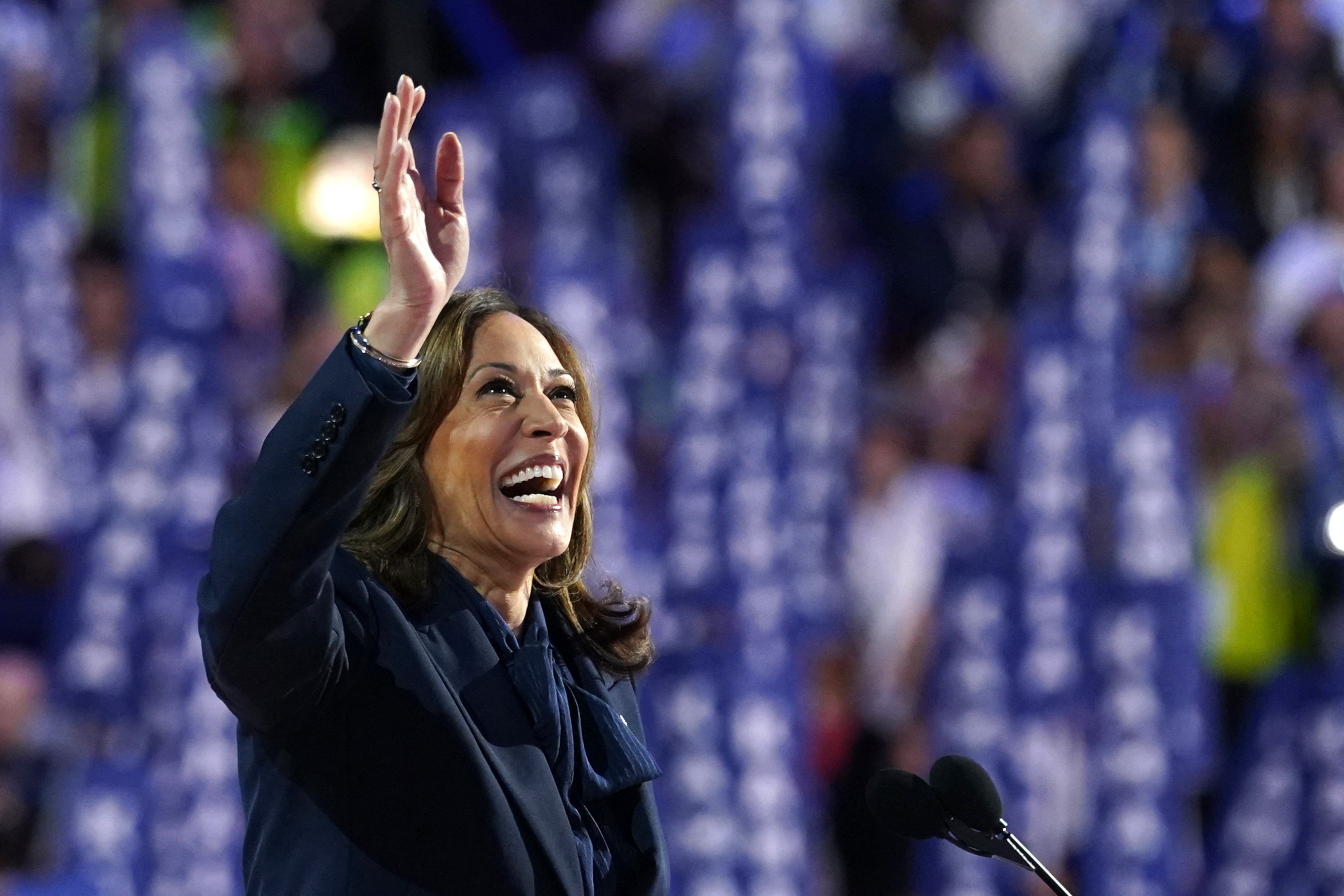
Democratic presidential candidate and US Vice President Kamala Harris on stage at the Democratic National Convention in Chicago, Illinois on August 22 (Photo: Reuters).
The Democratic National Convention (DNC) in Chicago, Illinois (August 18-22) officially selected Vice President Kamala Harris as the Democratic Party's candidate for the presidential election on November 5. In the past month since being unexpectedly introduced by President Joe Biden, Ms. Harris has achieved rare successes and made a spectacular breakthrough in the race with Republican candidate Donald Trump, including in some "battlefield" states. But will that continue to be maintained and be enough to help the current South Asian-American vice president make history, becoming the first female president of the "land of the stars and stripes"? This is a question that is not easy to answer because it depends on many different factors. There are only a little over two months left until the day voters go to the polls, but that is enough time for "any scenario to happen", if not because of some rare unusual development, then because of the very complex and comprehensive challenges that Ms. Harris is facing. First, for a long time, the 2024 US presidential election campaign has been mainly a race between current President Biden and former President Trump. The race has been a stalemate until the two candidates had their first live debate in early June. At this debate, President Biden's physical and mental decline due to age was clearly revealed, causing him to quickly lose the trust not only of public opinion but also within the Democratic Party. On the contrary, the failed assassination attempt on Mr. Trump on July 13 while the former President was campaigning in Pennsylvania and the Republican National Convention in Milwaukee just two days later helped Mr. Trump take a fairly solid lead over Mr. Biden. In such a context, under increasing and continuous pressure from within the Democratic Party, first of all from powerful figures such as former House Speaker Pelosi and former President Barack Obama, on July 21, President Biden announced his withdrawal and introduced Vice President Harris as his candidate to continue the election campaign. The Democratic Party is showing high solidarity and unity in its determination to help the new candidate win the election. Personally, Ms. Harris also has clear advantages over Mr. Biden, especially in terms of health, age and clarity. However, this seems to be only a forced situational solution, not a strategic solution carefully prepared by the Democratic Party in advance. Moreover, Mr. Biden's withdrawal from the race at the last minute was not entirely voluntary. According to the US press, there has been a certain rift in the relationship between incumbent President Biden on one side and Mr. Obama and Ms. Pelosi on the other. Therefore, the risks to the unity and unity of the Democratic Party as well as Vice President Harris's campaign are entirely possible. Second , Mr. Biden's introduction of Ms. Harris to replace him in the race against former President Trump marks the first time an incumbent president has had to withdraw from the race when everything has entered the sprint stage. However, the history of US presidential elections has also witnessed a number of times when incumbent presidents decided not to run for re-election, the most recent of which was the 1968 election. That was when President Lyndon Johnson announced that he would not run for another term, but decided to introduce his close ally, Vice President Alfred Humphrey, to continue the race. Although he easily became the Democratic candidate, Vice President Humphrey did not receive the support of the majority of voters and lost to Republican candidate Richard Nixon. Looking back at this historical precedent, it can be seen that Ms. Harris is currently facing a similar challenge. However, the current political and social context in the US is very different from 1968. According to a Gallup poll released on August 10, 58% of Americans believe that the country needs major change, of which 42% support having a female president. This number shows that Ms. Harris has a better chance than Mr. Humphrey did in 1968, but also puts pressure on convincing voters of her leadership ability.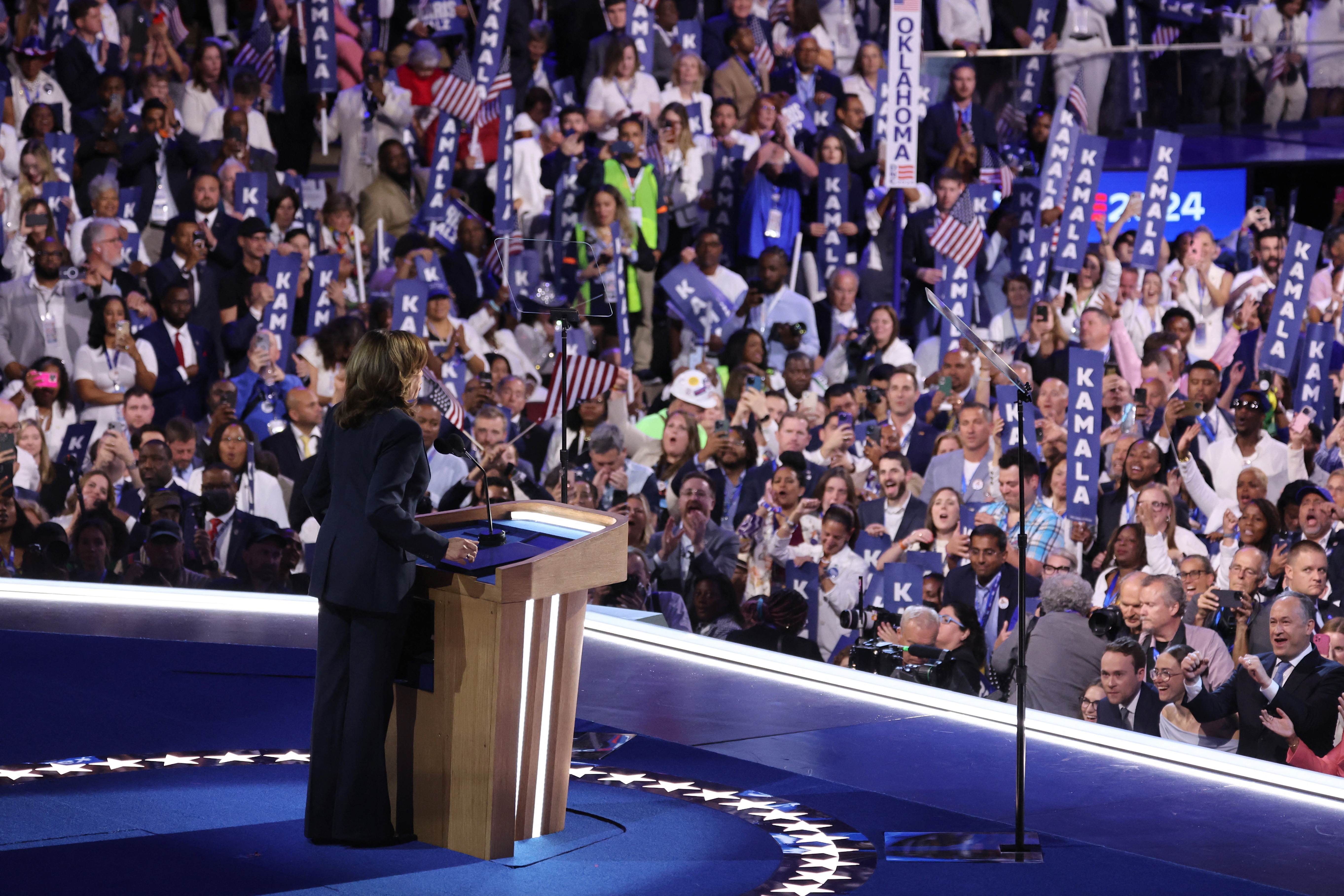
Ms. Harris speaks to supporters at the Democratic National Convention (Photo: Reuters).
Third , the "honeymoon" that Ms. Harris is enjoying is very special as the female candidate has quickly reversed President Biden's defeat and continuously pursued Mr. Trump. In addition, the $500 million that Ms. Harris's campaign raised in the first 3 weeks has "broken all previous records". However, it is difficult to say that it is entirely due to Ms. Harris herself, but a large part comes from the favor of the Democratic Party and the public for the new candidate. In particular, female and young voters who have been disappointed by President Biden's overall inferior performance in recent times, suddenly feel hopeful and excited to support the new, young and dynamic female candidate. According to a CNN poll on August 18, 72% of female voters under 35 support Ms. Harris, compared to 45% who supported Mr. Biden before. However, such strong support is unlikely to be stable and sustainable, especially when candidates have to delve into key national policy issues. Voters, especially women, can easily change their views if they find content in Ms. Harris's campaign that they cannot agree with. Al Jazeera reported that the group "Muslim Women for Ms. Harris", which has long been a strong supporter of the Democratic Party and candidate Harris, has disbanded after their request to send a representative to the Democratic National Convention to directly express support for the Palestinians and protest Israel's continued targeting of Palestinian women and children in the Gaza Strip was rejected by the convention organizers. This is certainly a disadvantage for Ms. Harris, signaling that the "honeymoon" is over and more complex and difficult issues lie ahead. Fourth , at the recent Democratic National Convention in Chicago, Ms. Harris tried to escape the "big shadow" of President Biden with preliminary mentions of some specific policy directions. In particular, in her acceptance speech, Ms. Harris presented a 5-point economic plan to address economic challenges with a focus on investing in clean energy, reforming the tax system and expanding the health care program. However, if the situation continues to worsen in the coming time, especially in the Middle East hotspot and the war in Ukraine, where the administration is deeply involved and Mr. Trump has an opposing view, it could push Ms. Harris's campaign into the risk of losing points in the eyes of the majority of American voters. At the same time, as the incumbent vice president, in addition to the natural advantages that come from that responsibility, Ms. Harris also finds it difficult to be "innocent" in the failures of the current administration. First of all, the chaotic withdrawal from Afghanistan in the summer of 2021 and the consequences of the current quagmire in Ukraine have made the risk of nuclear weapons and the possibility of World War 3 more present and talked about than ever. Meanwhile, the confusion and inefficiency that the US healthcare system has encountered before the Covid-19 pandemic, the recent economic slowdown, high inflation, fewer jobs created than expected and the flow of illegal immigrants across the southern border has not been stopped... According to the latest report from the US Department of Labor on August 20, the inflation rate in July this year increased to 4.2% while the inflation rate in June was only 3.8%. The above issues could become a big "minus point" for Ms. Harris, if Mr. Trump switches from personal attacks, his opponent's origin and gender to the above "achievements" of Vice President Harris and her future policy direction. Fifth , Ms. Harris's focus on presenting herself as a serious, disciplined candidate starting as an attorney general in California, in opposition to a businessman Trump who has always had problems with the law, and has recently been indicted on 31 specific charges and will soon have to continue to appear in court...; or Ms. Harris's attempt to present herself as a symbol of change and always looking towards the future, in opposition to Mr. Trump who is considered conservative, full of prejudice against women and unreliable, also has two sides. In theory and in the short term, the above may be a very beneficial advantage for the female candidate of the Democratic Party, but in reality, in the US political arena, at least in the past decade, it has been proven that businessman Trump is a very special phenomenon and no one can subjectively take it lightly. Although he himself is always accompanied by all kinds of scandals, Mr. Trump still has a special appeal, is not easily defeated and is incredibly resilient. According to a Quinnipiac University poll released on August 19, 51% of Republican voters believe the legal charges against Mr. Trump are just a "political witch hunt," while only 31% believe they are legitimate charges.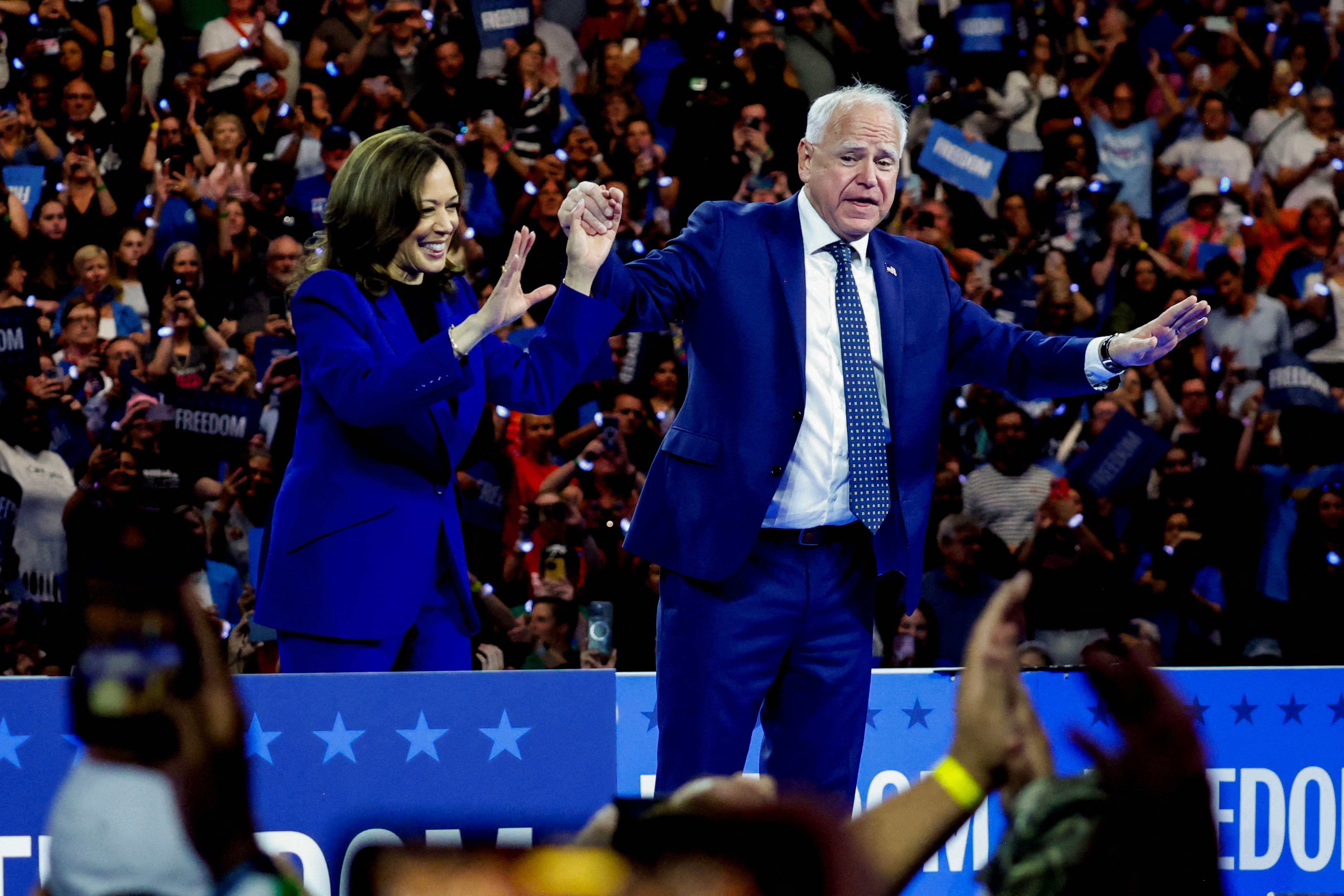
Democratic presidential candidate Kamala Harris and vice presidential candidate Tim Walz attend a campaign rally in Milwaukee, Wisconsin (Photo: Reuters).
Sixth , after the initial period of surprise, perhaps even confusion and disorientation when suddenly his opponent is no longer the older and exhausted incumbent president, but a female candidate in her prime and full of energy, Mr. Trump is gradually returning to himself and is ready for a live debate on television with Ms. Harris. Everything is still open, but in reality, while Mr. Trump is experienced in debates, Ms. Harris has little experience in this area and rarely gives direct interviews. According to an analysis by the Washington Post on August 22, of Ms. Harris's 20 most recent television interviews, only 3 were live and unprepared. This could be disadvantageous for Ms. Harris in the upcoming debates with Mr. Trump, who is famous for his quick improvisational style on the political stage. Notably, in addition to the recent decision by American technology billionaire Elon Musk to turn to support, Mr. Trump has also just achieved a very meaningful success when he persuaded independent candidate Robert Kennedy Jr., a descendant of the powerful Kennedy family in the US, to agree to stop his own election campaign to switch to supporting the Republican candidate. This new development will certainly have a negative impact on the total number of votes for Ms. Harris, because Mr. Kennedy was initially one of President Biden's opponents in the race for the Democratic nomination and had up to 20% of voters supporting him. According to a poll recently released by Morning Consult, after Mr. Kennedy announced his support, Mr. Trump's support rate increased by 3 percentage points from 44% to 47%, while Ms. Harris's support rate decreased by 2 points to 44%. Seventh , public opinion polls before the US presidential election, although conducted using very advanced methods, still always have a probability of error. In the November 2016 presidential election, Hillary Clinton was always ahead of Trump by enough margin to ensure victory. However, in the end, the winner was businessman Trump, not veteran politician Clinton as many predicted. Assuming that Harris will overcome all of the above challenges, except that she is a female candidate and holds a high position in the government (an important reason why Hillary Clinton lost to Donald Trump in the 2016 election), whether or not Harris will become the first female US president may still depend largely on whether Americans are truly ready to accept a female politician, especially a woman of color of Indian descent, as president. Since 2016, American society has undergone significant changes. According to the Pew Research Center, the number of Americans willing to vote for a female presidential candidate has increased from 52% to 68% - an encouraging sign for Ms. Harris. Overall, it can be said that the race between Ms. Harris and Mr. Trump is not only a confrontation between two individuals, but also a debate about the future of America, in which Ms. Harris represents a newer vision, more oriented towards the future with strong changes, while Mr. Trump is more conservative, continuing to look to the past with the message "Make America Great Again" that was successful 8 years ago. As the November 5 election day approaches, every American voter will face an important decision not only for themselves but also for the future of the country. Let's wait and see if this election will create a historic turning point. This is also what makes this year's US presidential election especially interesting and attracts widespread public attention not only in the US but also around the world .Dantri.com.vn
Source: https://dantri.com.vn/the-gioi/7-thach-thuc-cua-ba-harris-trong-cuoc-doi-dau-kich-tinh-voi-ong-trump-20240828122704367.htm

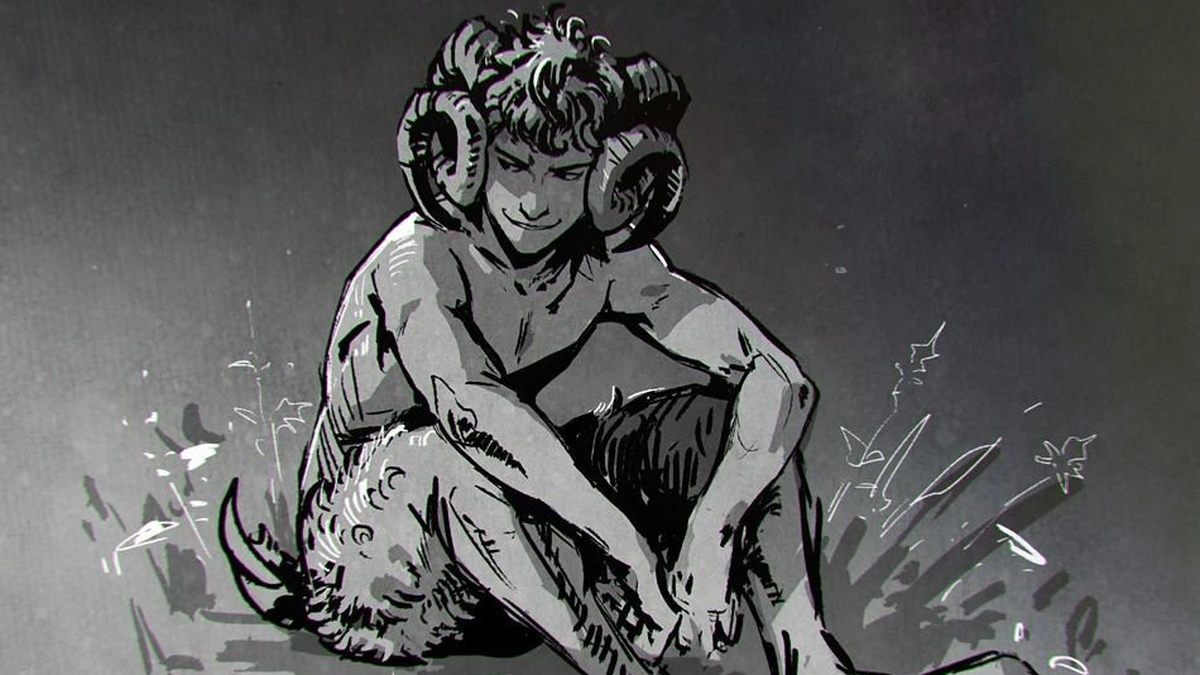



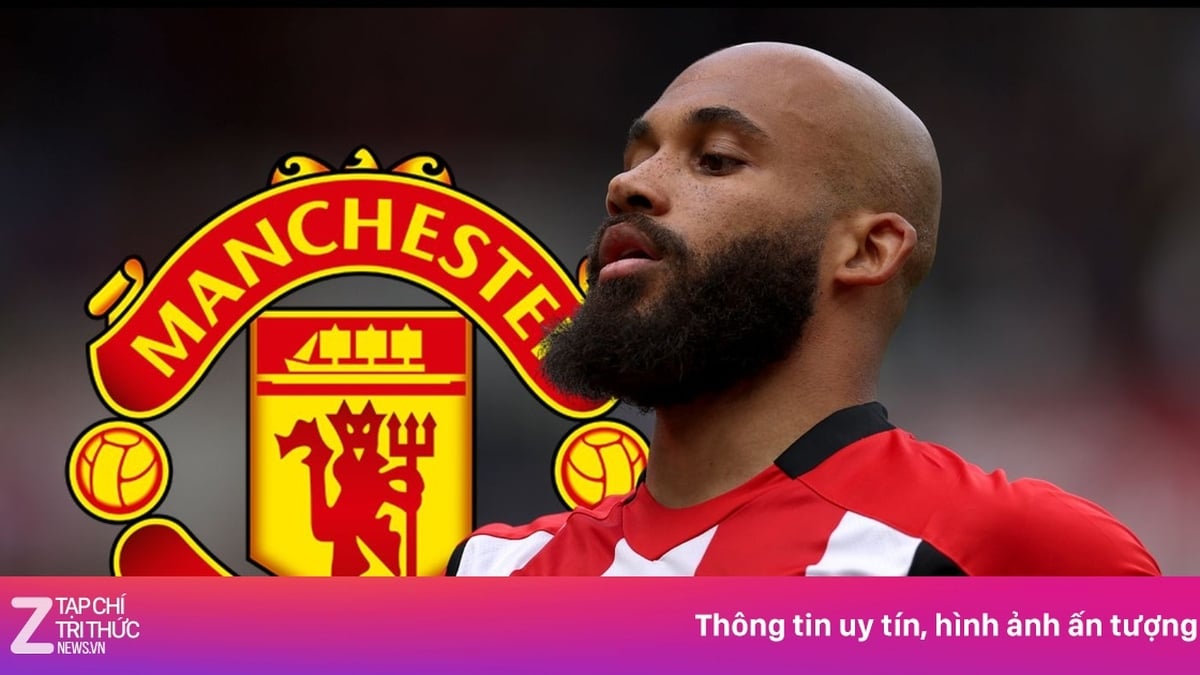


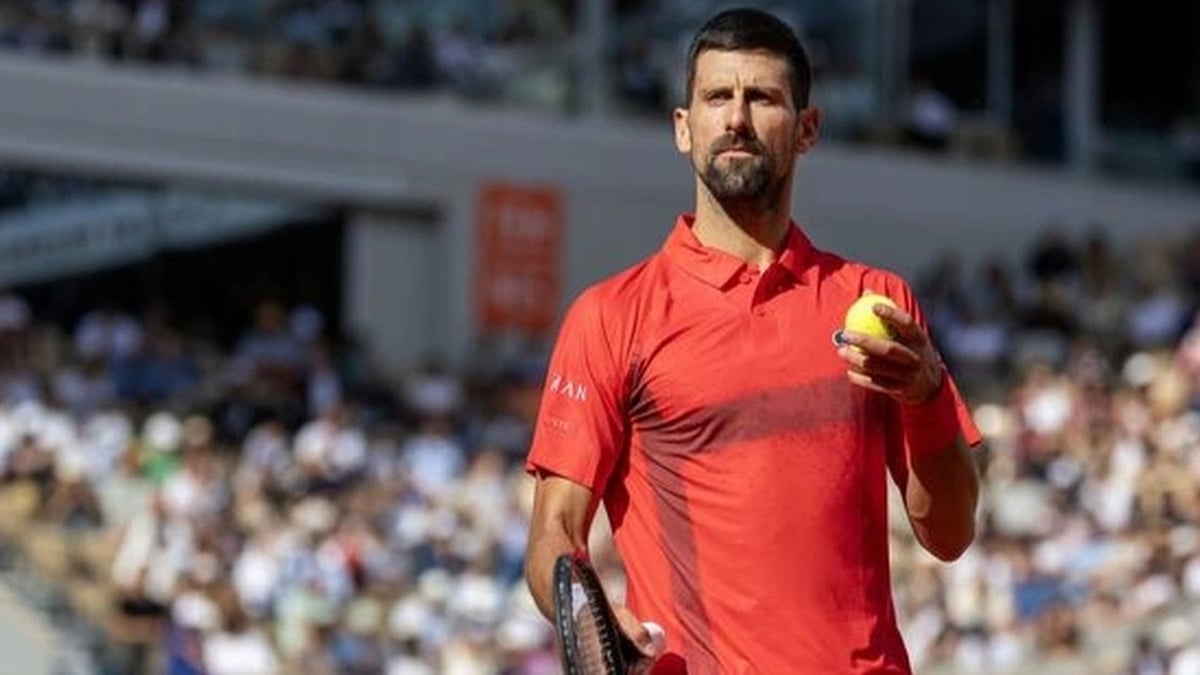



















































































![[Infographic] In 2025, 47 products will achieve national OCOP](https://vphoto.vietnam.vn/thumb/402x226/vietnam/resource/IMAGE/2025/7/16/5d672398b0744db3ab920e05db8e5b7d)





Comment (0)